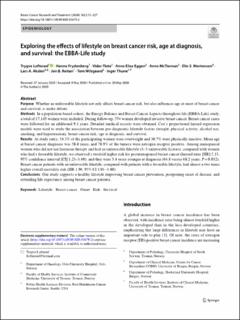Exploring the effects of lifestyle on breast cancer risk, age at diagnosis, and survival: the EBBA-Life study
| dc.contributor.author | Lofterød, Trygve | |
| dc.contributor.author | Frydenberg, Hanne | |
| dc.contributor.author | Flote, Vidar Gordon | |
| dc.contributor.author | Eggen, Anne Elise | |
| dc.contributor.author | McTiernan, A | |
| dc.contributor.author | Mortensen, Elin Synnøve | |
| dc.contributor.author | Akslen, Lars A. | |
| dc.contributor.author | Reitan, J. B. | |
| dc.contributor.author | Wilsgaard, Tom | |
| dc.contributor.author | Inger, Thune | |
| dc.date.accessioned | 2021-04-06T18:17:09Z | |
| dc.date.available | 2021-04-06T18:17:09Z | |
| dc.date.created | 2021-01-18T15:32:10Z | |
| dc.date.issued | 2020 | |
| dc.Published | Breast Cancer Research and Treatment. 2020, 182 (1), 215-227. | |
| dc.identifier.issn | 0167-6806 | |
| dc.identifier.uri | https://hdl.handle.net/11250/2736450 | |
| dc.description.abstract | Purpose Whether an unfavorable lifestyle not only affects breast cancer risk, but also influences age at onset of breast cancer and survival, is under debate. Methods In a population-based cohort, the Energy Balance and Breast Cancer Aspects throughout life (EBBA-Life) study, a total of 17,145 women were included. During follow-up, 574 women developed invasive breast cancer. Breast cancer cases were followed for an additional 9.1 years. Detailed medical records were obtained. Cox’s proportional hazard regression models were used to study the association between pre-diagnostic lifestyle factors (weight, physical activity, alcohol use, smoking, and hypertension), breast cancer risk, age at diagnosis, and survival. Results At study entry, 34.3% of the participating women were overweight and 30.7% were physically inactive. Mean age at breast cancer diagnosis was 58.0 years, and 78.9% of the tumors were estrogen receptor positive. Among menopausal women who did not use hormone therapy and had an unfavorable lifestyle (3–5 unfavorable factors), compared with women who had a favorable lifestyle, we observed a twofold higher risk for postmenopausal breast cancer (hazard ratio [HR] 2.13, 95% confidence interval [CI] 1.23–3.69), and they were 3.4 years younger at diagnosis (64.8 versus 68.2 years, P = 0.032). Breast cancer patients with an unfavorable lifestyle, compared with patients with a favorable lifestyle, had almost a two times higher overall mortality risk (HR 1.96, 95% CI 1.01–3.80). Conclusions Our study supports a healthy lifestyle improving breast cancer prevention, postponing onset of disease, and extending life expectancy among breast cancer patients. | en_US |
| dc.language.iso | eng | en_US |
| dc.publisher | Springer | en_US |
| dc.rights | Navngivelse 4.0 Internasjonal | * |
| dc.rights.uri | http://creativecommons.org/licenses/by/4.0/deed.no | * |
| dc.title | Exploring the effects of lifestyle on breast cancer risk, age at diagnosis, and survival: the EBBA-Life study | en_US |
| dc.type | Journal article | en_US |
| dc.type | Peer reviewed | en_US |
| dc.description.version | publishedVersion | en_US |
| dc.rights.holder | Copyright 2020 The Author(s). | en_US |
| cristin.ispublished | true | |
| cristin.fulltext | original | |
| cristin.qualitycode | 1 | |
| dc.identifier.doi | 10.1007/s10549-020-05679-2 | |
| dc.identifier.cristin | 1873446 | |
| dc.source.journal | Breast Cancer Research and Treatment | en_US |
| dc.source.40 | 182 | |
| dc.source.14 | 1 | |
| dc.source.pagenumber | 215-227 | en_US |
| dc.identifier.citation | Breast Cancer Research and Treatment. 2020, 182, 215–227 | en_US |
| dc.source.volume | 182 | en_US |
Files in this item
This item appears in the following Collection(s)
-
Department of Clinical Medicine [2043]
-
Registrations from Cristin [9482]

